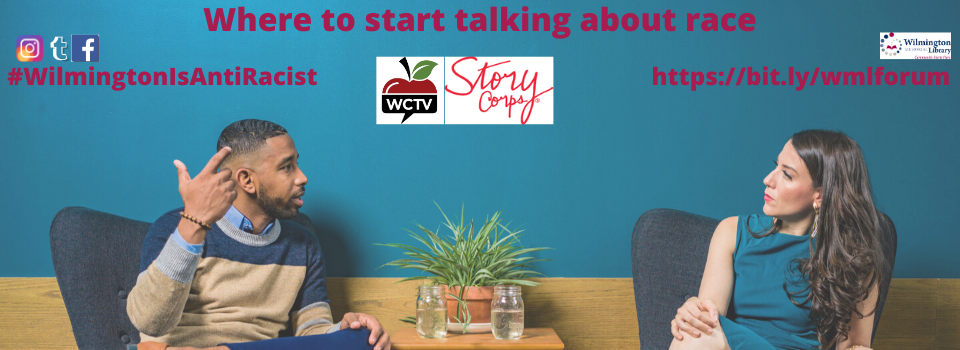 Wilmington, like the rest of the country, is working toward establishing an antiracist community. Use the comments section below to share your thoughts and experiences with racism. If you’d like to learn more about racism, visit our antriracist resources page.
Wilmington, like the rest of the country, is working toward establishing an antiracist community. Use the comments section below to share your thoughts and experiences with racism. If you’d like to learn more about racism, visit our antriracist resources page.
Here are a few questions to think about:
- What does being antiracist mean to you?
- How has your race affected your life?
- When was the first time you realized there was systemic racism in America?
Other places to talk about race are:
- Use #WilmingtonIsAntiracist on Instagram, Twitter, and Facebook.
- Schedule an interview to talk about race at WCTV by emailing tech@wilmlibrary.org The interviews will be uploaded to StoryCorp Communities and then archived at The Library of Congress: https://archive.storycorps.org/communities/wilmington-working-toward-antiracism/


In his book “How to Be Antiracist”, Ibram X Kendi says
“To be antiracist is to think nothing is behaviorally wrong or right — inferior or superior — with any of the racial groups. Whenever the antiracist sees individuals behaving positively or negatively, the antiracist sees exactly that: individuals behaving positively or negatively, not representatives of whole races. To be antiracist is to deracialize behavior, to remove the tattooed stereotype from every racialized body. Behavior is something humans do, not races do.”
There is no one way to do anything. Accepting people as individuals and not “representatives of their race” is one way to be antiracist.
Thank you WML for facilitating these difficult conversations that are also necessary. One of my favorite quotes from White Fragility by Robin Diangelo is “Discomfort in talking about race, limits the ability of white people from forming authentic connections across race lines.”
I think the shifting conversation from how to be an ally to how to be actively antiracist is an important shift for us white people. Racism is in the very air around us, esssentially. In order to root that out, we should clarify behaviors as racist or antiracist – it’s much clearer to identify those behaviors as those that actively root it out or those passive behaviors that perpetuate racism (or excuse it) in our society.
It will take work, but it’s important work.